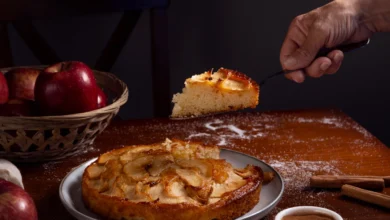Can You Freeze Scones – Secrets to Preserving Freshness

As someone who enjoys baking scones fresh from the oven, I often find myself making a double batch so I have some on hand for busy mornings. Once cooled well, the extra scones can be frozen to enjoy later. To freeze scones, I like to individually wrap each one in a small re-sealable plastic bag or place them in an airtight container. This packaging helps protect the scones from freezer burn so they maintain their fresh quality when thawed. I usually place a sheet of waxed or parchment paper between each scone to prevent them from sticking together. Properly packaged and frozen, scones will maintain good quality in the freezer for up to 3 months.
When ready to serve a frozen scone, I place it on the counter to defrost overnight in the packaging or for a few hours at room temperature still sealed in the bag. Once thawed, the scone texture may be softer than one freshly baked but it still tastes delicious spread with jam or whipped cream. A frozen scone is also a quick treat when time is short as they can be popped in the toaster oven or microwave for a few minutes to warm through before enjoying. With some strategic baking and freezing, scones can be enjoyed long after they are baked for a comforting snack anytime.
Contents
- Can You Freeze Scones?
- What are Scones?
- Reasons You May Want to Freeze Scones
- What Supplies Do You Need to Bake and Freeze Scones
- Can You Freeze Baked Scones?
- Methods of Freezing Scones
- How to Defrost Baked Scones
- How to Reheat Frozen Baked Scones
- How to Bake Frozen Scones
- Can You Freeze Unbaked Scones?
- What Ingredients Do You Need for Scone Dough?
- Frequently Asked Questions
- Can you freeze scones with jam and cream?
- Is it best to freeze scones baked or unbaked?
- Can you freeze cheese scones or buttermilk scones?
- Can you freeze scones twice ?
- Do you need to defrost frozen scones before baking?
- Does the type of scone affect how you should freeze/reheat them?
- How long do frozen scones last in the freezer?
- How long do baked scones keep?
- Are scones good after being frozen?
- Is it best to freeze scones cooked or uncooked?
Can You Freeze Scones?
Now, we will discuss about making and freezing the scones, and using them for different occasions. Let’s make it.
What are Scones?
Scones are a lightly sweetened baked good that is simply made with a handful of ingredients like flour, baking powder and cold butter that is cut into the dry ingredients to form a crumbly texture. I enjoy experimenting with adding heavy whipping cream to make the scones extra moist and tender. Scones are usually served alongside jam, butter or clotted cream for spreading. There is a wide variety of flavours too from plain to fruit-filled or topped with a sweet glaze.
Scones come in different shapes, from rounded circular rounds to triangular wedge shapes and can even resemble an American biscuit. No matter the style, their crumbly texture makes them the perfect treat to enjoy for breakfast, brunch or afternoon tea. Believed to originate from Scotland, scones later became popular in places like England and the United States. With only a handful of ingredients like flour, butter and milk or cream, it’s amazing what a simple super delicious treat a fresh scone can be.
Reasons You May Want to Freeze Scones
There are a few good reasons one might consider freezing their leftover scones rather than letting them go to waste. For one, scones are best when eaten fresh so freezing ensures you can continue to enjoy those yummy baked goodies at a later time. Freezing also allows you to have a stash of freshly baked scones on hand for unexpected guests.


Baking a big batch just means you have more to save for later rather than stuffing yourself full after eating them all at once hot out of the oven. Freezing half the scones lets you bake later as well when short on time. The recipe may make more than is needed at once so freezing helps make use of extras without altering the shelf life, which is generally short if just left on the counter. In the end, freezing allows you to enjoy the freshly baked pleasure of scones even if they aren’t just out of the oven.
What Supplies Do You Need to Bake and Freeze Scones
Freezing scones requires only a few essential supplies:
- Airtight container – A reusable container with an airtight seal is perfect for storing frozen scones. It helps prevent freezer burn and moisture loss.
- Parchment-lined baking sheet – Baking the scones requires a sheet pan covered with parchment paper for easy removal once baked.
- Large mixing bowl – To combine and mix the scone ingredients, you’ll need a roomy bowl big enough to hold the dry and wet ingredients as well as your mixing utensils.
With just these three basics – an airtight container, baking sheet, and mixing bowl – you’ll have everything needed to bake and properly store scones in the freezer for later enjoyment.
Can You Freeze Baked Scones?
While you can freeze baked scones, the texture may be greatly altered compared to freshly baked. This is because baked goods like scones contain a ton of moisture, and the freezing process can cause them to dry out over time in the freezer. Freezing halts the staling process briefly but thawing resurrects it, so baked scones often suffer more noticeable texture changes versus an unbaked version.
To freeze baked scones, allow them to cool completely at room temperature first so they don’t steam up inside the packaging during freezing. Place scones in a single layer in an airtight container, separating each with parchment to prevent them from touching and sticking together. When planning to thaw the whole batch, it’s best to freeze one scone at a time on a cookie sheet lined with parchment paper and keep frozen for up to about a month to reduce the risk of freezer burn.
To reheat frozen baked scones, you can remove one or more from the freezer bag or container to thaw either on the kitchen counter at room temperature or directly in the toaster oven or regular oven preheated to 350 °F (76 °C) for 5-7 minutes until warmed through and soft inside again.
Methods of Freezing Scones
There are a few different methods one can use for freezing scones depending on your needs and preferences. Some prefer to freeze unbaked scones, which has the benefit of needing less storage space since they aren’t puffed up after baking. However, baking from frozen takes more time. Freezing baked scones is also an option, with the pros being ability to eat straight from the freezer. The cons are they take up more room.
For unbaked scones, I’ve found individually wrapping each scone in a small heavy-duty freezer bag or placing them in an airtight container works well. This method is great for single servings that are easy to grab and go. Leftover baked scones can be stored long-term in my first choice of containers – a Tupperware with an airtight seal. I’ve also had success loosely wrapping a whole batch of scones in plastic wrap then freezer paper or foil if preparing to share or transport in the freezer. For baked mini scones, I layer them spaced out on a baking sheet, seal with lid or wrap, and once frozen transfer to a round Tupperware that fits the entire batch perfectly.
While each method has slight variations, the overall goal is to maintain quality and prevent freezer burn so the scones stay fresh for months. Properly sealed, unbaked or baked scones should maintain quality in the freezer from a few weeks to little longer depending on the specific storage method and container used.
How to Defrost Baked Scones
Room temperature defrosting
Place frozen scones on a plate or parchment lined baking sheet and let sit at room temperature for at least one hour or up to overnight to gently defrost.
Refrigerator thawing
Transfer frozen scones to the refrigerator and allow to thaw overnight or for at least 4-6 hours. This slower method helps prevent excess moisture.
Microwave thawing
Use microwave power at 50% and begin with short increments such as 45 seconds to 1 minute depending on scone size. Check and rotate as needed until no longer icy.
Warm serving
For individual scones, directly microwave for 15-30 seconds to warm through right before serving. For a whole batch, place scones on baking sheet and warm in a 300°F oven for 5-10 minutes until heated through.
How to Defrost Scones Quickly
If you want to reheat the scones right away, you can use these methods
1- Room Temperature
Leave frozen scones on the counter in their packaging and let sit at room temperature. Check periodically and remove when pliable but still cool, about 30–60 minutes.
2- Oven
For larger batches, preheat the oven to its lowest setting, around 200 °F / 93 °C. Place frozen scones directly onto a baking sheet and bake for 10–15 minutes. This helps defrost and warm them up quickly if you need to hurry and reheat for serving. Keep a close eye to avoid over-baking.
Defrosting times will vary depending on the number and size of scones. Using any of these faster methods means scones can be defrosted and enjoyed promptly without having to plan much ahead or wait several hours on the counter. Just take care not to over-defrost and let them sit too long at room temperature before baking/reheating.
RELATED: Apple and White Chocolate Scones
RELATED: Can You Freeze Tiramisu
How to Reheat Frozen Baked Scones
There are a few different methods for reheating frozen baked scones depending on their state and how many you need to warm at once. For single scones, the microwave on 100% power works well, heating one at a time for 10-20 seconds until warmed through, adjusting times as needed based on size. For reheating a batch, spread fully thawed and room temperature scones out on a parchment lined baking sheet and bake in a preheated 350°F oven for 5-8 minutes until heated through. A toaster oven on the bake setting can also work well for smaller batches. The goal is to warm frozen scones gently without drying them out.
How to Bake Frozen Scones
Baking frozen unbaked scones requires just a bit of extra time. Place frozen dough rounds on a parchment lined cookie sheet and let them thaw slightly at room temperature while the oven preheats to the temperature specified in your recipe. You can also skip steps like brushing with egg wash or sugar sprinkles for the frozen dough since this helps prevent steam pockets. Once the oven is hot, bake frozen scones at 350°F for 18-20 minutes, checking every 2 minutes if needed and baking until the edges are lightly golden brown and the centers are no longer icy and feel soft when pressed. Extend baking time as needed for fully frozen scones.
Can You Freeze Unbaked Scones?
It is indeed possible to freeze unbaked scones. Here are a few tips:
- Prepare and freeze scones before baking as you normally would, being sure to note that freezing may prevent them from rising as well once baked. For best results, bake immediately after thawing or refrigerating.
Freezing unbaked scones has the advantage of keeping the dough colder longer since it’s not yet baked. In my opinion, this is the best way to freeze scones as it allows you to bake them freshly as needed. I like to make and cut or shape the raw dough into wedges or chunks and freeze them on a baking sheet, then transfer to a resealable bag. Once baked, the scones have a lovely flakey, biscuit-like texture since keeping the butter and dough cold affects the end result. Baking straight from frozen does take a bit longer but still results in scones that are perfect for serving. Removing a couple frozen dough wedges and baking requires much less time than making a whole fresh batch from scratch.
What Ingredients Do You Need for Scone Dough?
The basic ingredients used for traditional scone dough include:
- Flour – Either all-purpose or cake flour is commonly used. Flour provides the structure and baked crumb of the scones.
- Baking Soda – A leavening agent that helps the scones rise and become light and fluffy when baked.
- Salt – Adds flavour and balances out the sweetness. A small amount of salt is used.
- Butter – Fat in the form of butter contributes tenderness and flavour. Cold butter is cut into the dry ingredients.
- Buttermilk – Acts as a liquid and tenderizer. Buttermilk’s acidity reacts with the baking soda.
- Egg – Helps scones rise higher and adds richness. One egg is typically used.
These basic scone dough ingredients can then be supplemented with optional mix-ins like raisins, dried cranberries, cheese, herbs, and spices to customize flavours. But this simple list forms the foundation of a classic scone.
Final Words
Scones can most definitely be frozen, both before and after baking. Proper freezing methods help scones retain their quality and taste when reheated later. While some small adjustments may be needed, freezing is a great way to save time and enjoy fresh baked scones even when you don’t have time to make them from scratch. With a little know-how, frozen scones can still become a delicious homemade treat.
Frequently Asked Questions
Can you freeze scones with jam and cream?
It’s generally not recommended to freeze scones that already have cream or jam inside, as the wet fillings can cause them to become soggy during freezing and thawing. Unfilled scones freeze and reheat much better, while allowing you to add jam or cream after baking.
Is it best to freeze scones baked or unbaked?
It depends on your preference and reason for freezing. Freezing baked scones allows them to last up to 3 months, compared to a few weeks for unbaked. However, unbaked scones will taste warmer and more like freshly baked once you bake them. To freeze for a quick delicious breakfast, unbaked may be the better option as you can prep dough ahead of time and have them ready in minutes with just microwave reheating.
Can you freeze cheese scones or buttermilk scones?
Yes, you can freeze any type of scone dough including cheese scones, buttermilk scones or blueberry scones. Just follow the same simple steps for defrosting and reheating, and they will yield delicious results that taste like they were freshly baked.
Can you freeze scones twice ?
While freezing baked or unbaked scones once is usually fine, it’s best to avoid freezing scones that have already been frozen and thawed. Freezing and thawing breaks down the structure of the scones over time. For best quality, it’s recommended to enjoy any scones that have been thawed from the freezer within a few days, rather than refreezing them again.
Do you need to defrost frozen scones before baking?
For unbaked scones, you don’t need to fully defrost before baking. Just follow recipe instructions, adding a few extra minutes to the baking time if frozen solid. For baked or reheated scones, rules are to warm them to a toasty temperature whether using the microwave, oven, or toasting. No need to fully defrost first.
Does the type of scone affect how you should freeze/reheat them?
The freezing and reheating methods generally work well for both sweet and savory varieties like cheese scones. Just watch savory ones closely when reheating to avoid drying out.
How long do frozen scones last in the freezer?
Baked scones can last up to 3 months in the freezer. Unbaked scones typically last 4 weeks but 3 weeks is a better bet for quality.
How long do baked scones keep?
Baked scones will keep at room temperature in an airtight container or sealed bag for about 3 days. They’ll last up to a week in the refrigerator.
Are scones good after being frozen?
Yes, frozen baked scones are still good for about a month to prevent freezer burn. Thaw on the counter and warm through before serving.
Is it best to freeze scones cooked or uncooked?
Most say freezing unbaked scones is best as it allows baking fresh batches as needed. They’ll keep in the freezer for up to 3 weeks versus 3 months for pre-baked.




